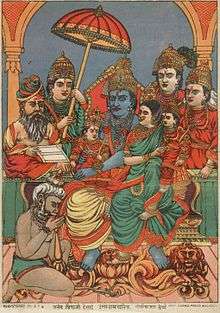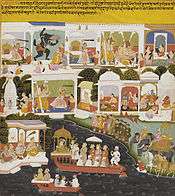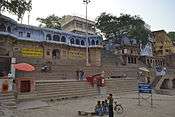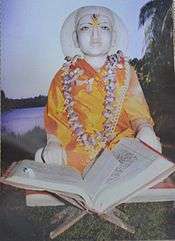
Goswami Tulsidas
Tulsidas Hindi pronunciation: [t̪ʊls̪iːd̪aːs̪], also known as Goswami Tulsidas; (1532–1623) was a Hindu poet-saint, reformer and philosopher renowned for his devotion to the god Rama. A composer of several popular works, he is best known as the author of the epic Ramcharitmanas, a retelling of the Sanskrit Ramayana in the vernacular Awadhi. He was acclaimed in his lifetime to be a reincarnation of Valmiki, the composer of the original Ramayana in Sanskrit. He is also considered to be the composer of the Hanuman Chalisa, a popular devotional hymn dedicated to Hanuman, the divine devotee of Rama. Tulsidas spent most of his life in the city of Varanasi. The Tulsi Ghat on the Ganges River in Varanasi is named after him.
Quotes
- Mother and father abandoned me at birth and the author of my life also did not write any worth or merit on the page of destiny.
- His confessional statements on his own experiences made in Kavitavali quoted in "A Garden of Deeds: Ramacharitmanas, a Message of Human Ethics", p. 49
- The world knows that to quell the belly-fire, I ate crumbs and morsels given by men of caste, high-caste, low-caste or no cast.
- In Kavitavali quoted in "A Garden of Deeds: Ramacharitmanas, a Message of Human Ethics", p. 72
- What did I not do, where did I not go, to whom did I not bow.
- In Vinay Patrika quoted in "A Garden of Deeds: Ramacharitmanas, a Message of Human Ethics", p. 276
- [I] begged for crumbs and morsels door to door...Plodding and dawdling around lanes.
- In Kavitavali quoted in "A Garden of Deeds: Ramacharitmanas, a Message of Human Ethics", p. 106
- Mine is no caste or cult, what care I for one or the other...
No one is of any use to me, nor am I of any use to anyone.
Don’t have a son to need, someone’s daughter to wed.
Tulsi is the slave of Rama, whoever may say whatever he likes.
Begged for food, slept in a mosque, have nothing to take and nothing
to give, call me a swindler or a saint, call me a Rajput or a Julaha.- A Muslim weaver is called a Julaha which Tusllidas preferred to be called, as he was brought up by a Muslim couple who were weavers who had picked him up and brought him up. Quoted in "A Garden of Deeds: Ramacharitmanas, a Message of Human Ethics", p. 106

Tulsidas:The story of Ramachandra, as narrated in the Valmiki Ramayan and the Adhyatma Ramayan, after reinforcing and revitalizing it with the essence of whatever the Puranas, the Vedas, and other scriptures could give, I, Tulsidas, am writing for the delight of my own soul.
- Am a servant of Rama,
Accredited to His Court,
What for should I
Be a Courier of man?- A couplet he composed when he refused to accept the honour as one of the Ratna’s (Jewel) as a poet in the Imperial court of Akbar by his friend Abdurrahim Khan-i-Khana. Quoted in "A Garden of Deeds: Ramacharitmanas, a Message of Human Ethics", p. 54
- The story of Ramachandra, as narrated in the Valmiki Ramayan and the Adhyatma Ramayan, after reinforcing and revitalizing it with the essence of whatever the Puranas, the Vedas, and other scriptures could give, I, Tulsidas, am writing for the delight of my own soul.
- In the invocation of his epic poetry of Ramacharitamanas. Quoted in "A Garden of Deeds: Ramacharitmanas, a Message of Human Ethics", p. 91
- He walks without legs,
hears without ears,
does all the deeds without hands.
He enjoys all the juices without a mouth,
spells all the truth without a voice,
touches everything without hands.
He see very object without eyes
and inhales all the scents without a breath.- Tulsidas’s definition of God in verse quoted in A Garden of Deeds: Ramacharitmanas, a Message of Human Ethics, p. 36
- God refuses to be mine,
thine or his.
For him the truth is but one
but the proud and the vain have forged many out of their desires and fancies.- Tulsidas in "A Garden of Deeds: Ramacharitmanas, a Message of Human Ethics", p. 36
- Faith is that which dispels desire,
Devotion is that which generates knowledge.
And Vedas say that knowledge is that which fashions freedom.- Tulsidas in "A Garden of Deeds: Ramacharitmanas, a Message of Human Ethics", p. 37
- No virtue is equal to the good of others and
no vice greater than hurting others.- Tulsidas in "A Garden of Deeds: Ramacharitmanas, a Message of Human Ethics", p. 37
- I call him Rama. You can call him by any other name but have faith in him, surrender all worldly desires and passions to his will and without effort, become disciplined and principled.
- Quoted in "A Garden of Deeds: Ramacharitmanas, a Message of Human Ethics", p. 5
- Yatha Raja Thatha Praja
- As the Ruler, so the people.
- Quoted in "A Garden of Deeds: Ramacharitmanas, a Message of Human Ethics", p. 5
- Paradheen sapanehun such naheen.
- In dependence, there is no happiness, even in a dream.
- Quoted in "A Garden of Deeds: Ramacharitmanas, a Message of Human Ethics" which principle Mahatma Gandhi adopted to give a national leadership motto, in P.7
- Faith in the Creator, who is mainly in his Godness and Godly in his man-ness, is like a human-self and can take him along.
- His counsel on Humanism in "A Garden of Deeds: Ramacharitmanas, a Message of Human Ethics", p. 32
- Unless one cultivates slave-master relationship with the Lord,
No one can go across the ocean of this material world.
Who is as virtuous a master as Rama?
And who is as vicious as I am?- Tulsidas quoted in "Hindu spirituality: Postclassical and modern", p. 77
- There is no difference between knowledge and devotion,
Both of them save the soul from the miseries of worldly life.- Tulsidas's philosophical approach, quoted in "Hindu spirituality: Postclassical and modern", p. 80
- To follow the path of knowledge is to tread on the edge of a sword.
Once you get into it, there is no escape.- Tulsidas's practical approach, quoted in "Hindu spirituality: Postclassical and modern", p. 80
About Tulsidas

M. Callewaert:Tulsidas’s long life span, during the cultural apogee of the Mughal Empire, encompassed a period of great religious ferment and creativity.

Tulsi Ghat is one of the ghats in Varanasi. It is named for Tulsidas who lived there while he wrote the Ramcharitmanas.
- It can be said without reservation that Tulsidas is the greatest to write in the Hindi language. Tulsidas was a Brahmin by birth and was believed to be a reincarnation of the author of the Sanskrit Ramayana, Valmiki.
- Constance Jones & James D. Ryan in Encyclopedia of Hinduism, p. 456
- You are so much after this bundle of flesh and bone? If you had half of that devotion to Rama, your life would be worthy and it will make you immortal.
- Tulsidas’s wife admonished him for his unbounded possessive impulse which lead to his donning the life of a saint. Quoted in "A Garden of Deeds: Ramacharitmanas, a Message of Human Ethics", p. 52
- Tulsidasa alone, though the most famous of them all, has no disciples that are called after his name. There are Vallabhachars and Radha Vallabhs and Maluk Dasis, Pran Nathis and so on in interminable succession, but there are no Tulsidasis. Virtually, however, the whole of Vaishnava Hinduism has fallen under his sway; for the principles that he expounded have permeated every sect and explicitly or implicitly now form the nucleus of the popular faith as it prevails throughout the whole of the Bengal Presidency from Hardwar to Calcutta.
- F.S.Growse, in According to Tradition: Hagiographical Writing in India, p. 80
- Tulsidas’s poetry, like that of most other bhakti-saints, is assumed to reflect an underpinning of personal religious experience and to contain allusions to events in author’s life.
- M. Callewaert and Rupert Snell in "According to Tradition: Hagiographical Writing in India", p. 80
- Tulsi acquired the title ‘Gosaim’ (goswami or ‘lord’), which is normally applied to a sectarian leader, through his militant struggle against the forces of Kali Yug.
- Gautam Candrik quoted in "According to Tradition: Hagiographical Writing in India", p. 81
- Tulsidas’s long life span, during the cultural apogee of the Mughal Empire, encompassed a period of great religious ferment and creativity.
- M. Callewaert, Rupert Snell in "According to Tradition: Hagiographical Writing in India", p. 83
- Tulsidas was a poor recluse who lived an ascetic life and prompted by an inner light, adapted an old epic in folk-verse which broke all barriers and spread far and wide.
- Shiva Kumar Tripathi in "A Garden of Deeds: Ramacharitmanas, a Message of Human Ethics", p. 36
- While Kabir’s or Dadu’s adherents may be numbered by hundreds of thousands, no less than ninety million Indians acknowledged him as their spiritual guide.
- Sir George Grierson noted this when Kabir and Dadu were Tulsidas’s contemporaries when the population of northern India at the time was about ninety million quoted in "A Garden of Deeds: Ramacharitmanas, a Message of Human Ethics", P.37
- Tulsidas alone, though the most famous of them all has no disciples that are called after his name.
- F.S.Growse, in "A Garden of Deeds: Ramacharitmanas, a Message of Human Ethics", p. 36
- Tuslidas’s attitude toward life and literature was distinctly more objective. Quite naturally, therefore, he has used the objective forms–the epic and the narrative- besides of course, the lyric as vehicles of his devotional poetry.
- K. R. Sundararajan in Hindu spirituality: Postclassical and modern, p. 73
On Tulsidas’s epic Ramacharritamanas

Shiva Kumar Tripathi: In the epic,[Ramacharritamanas], ‘Unity’ was Tulsidas’ primary goal, ‘humanity’ his foremost concern and his cardinal objective was ‘faith’ in the creator who had saved and sustained him through religious bestialities, who was himself trapped inside deep mud and screaming to be rescued...
_Jodhpur%2C_c._1775%3B_62.7_x_134.5_cm_Mehrangarh_Museum_Trust.jpg)
P.E.Keay: The Ramacharitamanas undoubtedly is the great poem worthy to rank among the great classical masterpieces of world literature.
- Tulsidas wrote 12 books, but, by far, the most important is the Ramacharitamanas (the holy Lakes of the Acts of Ram), a Ramayana written in old Hindi (Avadhi) couplets. The book was written under the direction of Hanuman himself. It is read all over North India, and particularly during the time of the Ramlila. It is sung aloud in large groups for devotional purposes.
- Constance Jones & James D. Ryan in "Encyclopedia of Hinduism", p. 457
- In the epic, [Ramacharritamanas] ‘Unity’ was Tulsidas’ primary goal, ‘humanity’ his foremost concern and his cardinal objective was ‘faith’ in the creator who had saved and sustained him through religious bestialities, who was himself trapped inside deep mud and screaming to be rescued. Tulsidas took him out of the gothic domes and planted him inside a human body equipped with passion, desire, genial emotion, an understanding heart and the will and power of doing good.
- Shiva Kumar Tripathi in "A Garden of Deeds: Ramacharitmanas, a Message of Human Ethics", p. 33
- Tulsidas is the highest tree in the garden of Hindu poetry, though his name does not appear in Aeen-i-Akbari or any book of Muslim historians or even narratives of European writers who worked on information taken from Persian historians. Yet, Tuslidas was the greatest man of India of his time. In fact he can be called greater than Akbar because the victory that the poet registered in the hearts of thousands of millions of people was greater and more lasting than all the imperious victories put together...the Ramacharritamanas is such an enormous epic that its English adaptation by Growse is of 362 pages. The declinations in this epic are so similar to Christianity that on numerous spots, if Rama is replaced by Christ, there can be no question.
- Vincent Smith in "A Garden of Deeds: Ramacharitmanas, a Message of Human Ethics", pp.34-35
- In the whole of Indian literature, Tulsidas is supreme....The devotion in his poetry is of the same order as of philosophy. And from the beginning to the end, not a word or an idea, can be spotted which is not perfectly neat and pious.
- Grierson, in "A Garden of Deeds: Ramacharitmanas, a Message of Human Ethics", p. 35
- No poet in England has ever been in the masses what Tulsidas has been to the people of this land.
- Edwin Greaves, in "A Garden of Deeds: Ramacharitmanas, a Message of Human Ethics", p. 35
- The Ramacharitamanas undoubtedly is the great poem worthy to rank among the great classical masterpieces of world literature.
- P.E.Keay in "A Garden of Deeds: Ramacharitmanas, a Message of Human Ethics", p. 35
- Ramacharitamanasa, the poet's magnum opus is an epic. Kavitavali (in spite of gaps here and there), Janaki Mangala, and Parvati Mangala, as also the other two smaller poems Barve Ramayana and Ramalala Nahchhoo are narrative.
- K. R. Sundararajan, in "Hindu spirituality: Postclassical and modern", p. 73
External links
This article is issued from
Wikiquote.
The text is licensed under Creative
Commons - Attribution - Sharealike.
Additional terms may apply for the media files.